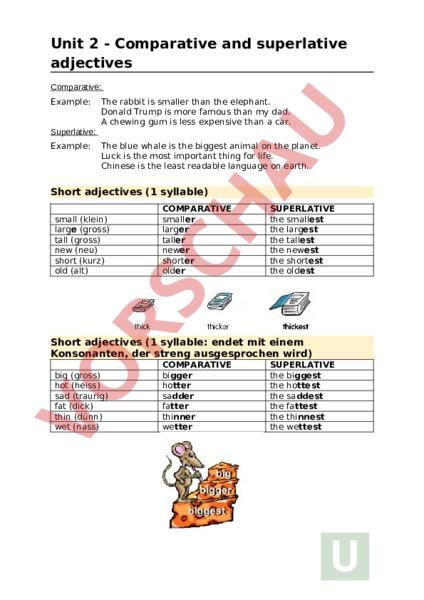Arbeitsblatt: comparative and superlative Theorie
Material-Details
Hefteintrag zu den comparative und superlative forms (1-2-3 syllables und irregular forms)
Englisch
Grammatik
7. Schuljahr
2 Seiten
Statistik
211348
60
0
04.12.2024
Autor/in
Yanick Hauenstein
Land: Schweiz
Registriert vor 2006
Textauszüge aus dem Inhalt:
Unit 2 Comparative and superlative adjectives Comparative: Example: The rabbit is smaller than the elephant. Donald Trump is more famous than my dad. chewing gum is less expensive than car. Superlative: Example: The blue whale is the biggest animal on the planet. Luck is the most important thing for life. Chinese is the least readable language on earth. Short adjectives (1 syllable) small (klein) large (gross) tall (gross) new (neu) short (kurz) old (alt) COMPARATIVE smaller larger taller newer shorter older SUPERLATIVE the smallest the largest the tallest the newest the shortest the oldest Short adjectives (1 syllable: endet mit einem Konsonanten, der streng ausgesprochen wird) big (gross) hot (heiss) sad (traurig) fat (dick) thin (dünn) wet (nass) COMPARATIVE bigger hotter sadder fatter thinner wetter SUPERLATIVE the biggest the hottest the saddest the fattest the thinnest the wettest Short adjectives (2 syllables, endet mit einem –y) noisy (laut) silly (albern) happy (glücklich) early (früh) COMPARATIVE noisier sillier happier earlier SUPERLATIVE the noisiest the silliest the happiest the earliest Long adjectives (2 or more syllables) famous (berühmt) exciting (aufregend) expensive (teuer) important (wichtig) COMPARATIVE more famous (more mehr) more exciting less expensive (less weniger) less important SUPERLATIVE most famous (most meist) most exciting least expensive (least wenigste) least important COMPARATIVE better worse less farther SUPERLATIVE the best the worst the least the farthest Irregular adjectives good bad little (wenig) far (weit)
